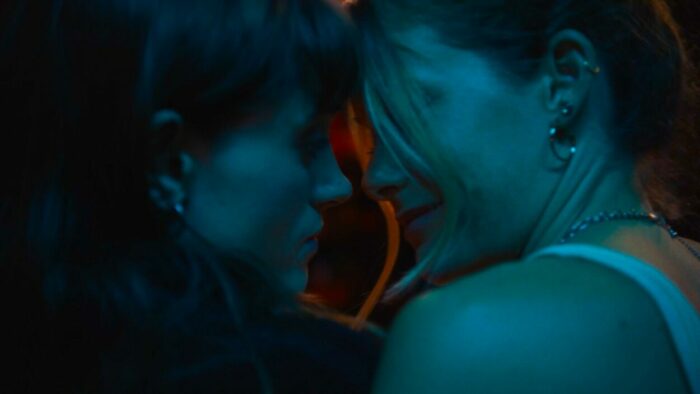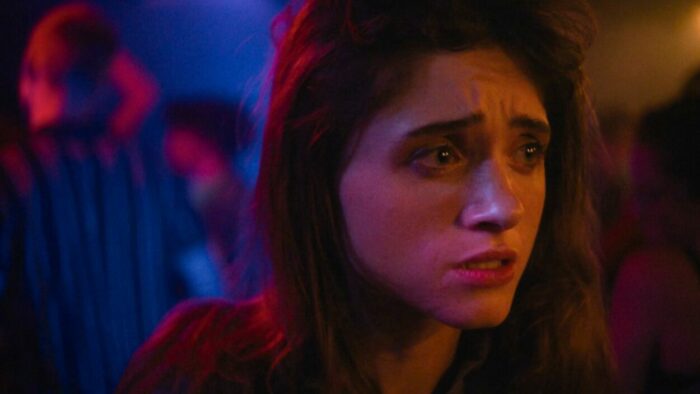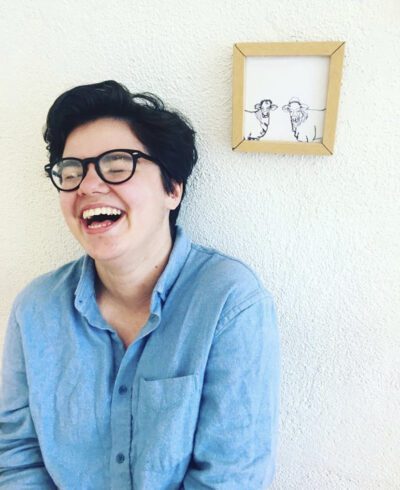There’s a listlessness that comes about after college. For four years, you’ve been told that if you put your head down and work hard, an incredible future will begin as soon as the graduation cap is tossed in the air. Often, though, what’s around the corner is rarely as exciting as one may picture it to be. It’s empty hours without structure and the expectation that life, whatever that means, should be beginning now. Chestnut takes place in the immediate, messy aftermath of college graduation, where growing up is filled with freedom, heartache, and hope.
Life as Annie (Natalia Dyer, last seen in All Fun and Games) knows it in Philadelphia is ending. She has a job waiting for her in a few months in Los Angeles, but until then, she has long, lazy summer days to fill. All of her friends from school have moved on, so she finds herself drinking alone at bars. One night, a stranger strikes up a conversation with Annie. Tyler (Legion‘s Rachel Keller) is the type of instantly magnetic person who’s intoxicating to be around, and Annie finds herself swept up in his orbit. Along with Tyler comes her platonic friend, Danny (Danny Ramirez of Top Gun: Maverick). Now Annie has a reason to stay in Philly and she’s forced to ask herself the question people have been asking for hundreds of years – should she throw her life away for a girl?

In a way, Chestnut feels like the perfect next step for Natalia Dyer. She’s been playing one of the perpetual teens on Stranger Things for eight years now, but the show’s final season is set to air in 2025 after being delayed by writer and actor strikes. Despite Stranger Things not being her first role, it is the performance that most will recognize for Dyer. Like Annie, Natalia is on the precipice of a change. Gone is the familiar consistency of the Netflix juggernaut. Perhaps she’s looking at her future with equal parts excitement and trepidation, but Chestnut makes it clear that there’s more to Dyer than the monster-slaying Nancy Wheeler we’ve known for the past eight years. It’s extremely refreshing to see Dyer in quiet moments that are in such stark contrast to the green screen chaos of Stranger Things.
Chestnut is not a love story. It’s a story about infatuation and co-dependency. That toxic mix of jealousy and friendship that’s oh-so-common for people in their early 20s. The relationship, if you can even call it that, between Annie and Tyler is the obsessive kind that can only exist when you’re young, broke, and seemingly have all the time in the world. Chestnut captures this specificity perfectly by showing how quickly Annie finds herself falling into the quicksand of Tyler and how unreciprocated it is on Tyler’s end. The audience just wants to shake Annie and tell her that this is not the friendship or love she’s craving. That it’s just a small blip in her life, not the life-altering, all-consuming relationship she thinks it is. Of course, if Annie knew all of this, we wouldn’t have a movie.
Even though Chestnut is not a love story, the first drink Annie and Tyler share together is shot a bit like a Meet Cute. The bar is hazy and their movements together are reminiscent of a dance. They move toward each other and then away, unsteady and unsure of what the other is thinking. To anyone familiar with these circumstances, each of the characters’ intentions is obvious. Like neon signs blinking above their heads, but impossible for the other to see. They are what the other person wants them to be and not who they actually are. Such is the case with many friendships that come about in a person’s early 20s.

Chestnut would feel perfectly at home as a double feature with Lady Bird. Both capture the invincible, self-destructive nature of coming of age and the bittersweet melancholy of realizing that the world is not what you imagined it would be. That people’s motivations are often beyond understanding and the simplest actions have a deep ripple effect on the people around you. Annie is obsessed with Tyler because she’s new, exciting, and proof that Annie can make “adult friends.” She falls under the exhilarating rush of someone shiny, someone who is the opposite of herself. It’s treacherous to lose yourself in another person, especially when that person doesn’t have your best interests at heart.
“I think I’m ready to leave,” Annie eventually says. It’s not a loud, certain statement. It’s said with a bit of a quiver in her voice and hesitancy, but isn’t that the way all declarative statements are made in one’s early twenties? Fearful, yet purposeful. Ever hopeful and immensely terrified. Chestnut allows viewers to experience the depths of those turbulent years through the eyes of Annie. It’s a beautifully melancholic look at growing up and all that goes along with it.



